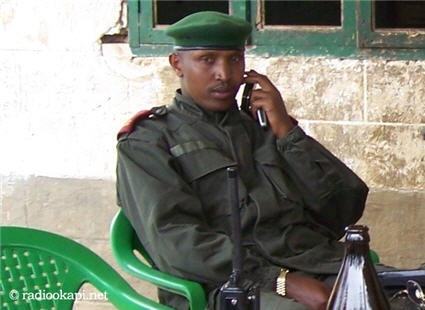
The UN has reportedly uncovered detailed information that neighbouring Rwanda, a key US ally, is backing the rebels in the east of the country.
Rwanda has denied the allegations.
The US has denied blocking the report. But it has now been several days since the report by the UN's "Group of Experts" was expected to be published.
The row concerns a rebel group led by Gen Ntaganda, known as "Terminator" and other former officers in the Congolese army. They rebelled from the army and, with their men, now hold territory in parts of DR Congo close to the Rwandan border.
Tens of thousands of people have been made homeless by their recent actions and related military moves by other armed groups.
Most armed groups in eastern DR Congo operate rackets under which they extract precious minerals or "tax" the local population.
The Group of Experts has compiled a report on their activities. This is a long-term investigation into how UN arms sanctions against rebels in DR Congo are respected - or not.
According to sources familiar with the Group of Experts latest report, it contains details of the transfer of weapons from Rwanda to the rebels. There are also reported to be details on how Gen Ntaganda and his allies travel to and from Rwanda in violation of the sanctions.
But Human Rights Watch said the US had used its influence to resist publishing the report's findings.
"The US and other Security Council members should do everything they can," Human Rights Watch said, "to expose violations of UN sanctions, including by Rwanda, and not attempt to cover them up."
Strategic relationships
Rwanda has strongly rejected allegations that it backs the rebels led by Gen Ntaganda.
The government in Kigali says the main problem in DR Congo is the existence of another armed group which includes people who took part in the genocide in Rwanda in 1994 and then fled to DR Congo. President Paul Kagame of Rwanda repeated this concern at a press conference this week.
The 1994 genocide and its military fallout changed a whole range of strategic relationships in central Africa and is a key to understanding the current row.
Some 800,000 ethnic Tutsis and moderate Hutus were slaughtered by radical Hutu groups. The mass killings of that year were only stopped when Mr Kagame's Tutsi-led army conquered the country.
Some of the policies of the United States and other Western nations towards Rwanda are driven by the guilt they feel for not having stopped the genocide.
Mr Kagame understandably rarely misses a chance to point out that the United Nations and some of its powerful member states failed to help stop the mass killings of his countrymen.
They therefore have no right, he says forcefully at any forum, to preach to him about DR Congo or anything else.
This highly charged background means that whatever happens next to the Experts' report will probably be controversial to one or other of the parties involved.
Related articles
- • Ebola outbreak declared an international Public Health Emergency (July 17, 2019)
- • DR Congo Delays Results of December Election (January 6, 2019)
- • No elections in DR Congo in December without electronic voting machines: INEC (February 13, 2018)
- • US Warns DR Congo Against Electronic Voting for Delayed Election (February 12, 2018)
- • DRC Seeks Arrest of Presidential Candidate Moise Katumbi (May 19, 2016)
- • Peacekeepers, Congo Army to Resume Joint Fight Against Rwandan Rebels (January 28, 2016)
- • Political tensions 'running high' in DR Congo ahead of 2016 elections (October 7, 2015)
- • UN Report Blames Ugandan Islamists for 237 Killings in DR Congo (May 14, 2015)
- • DRC Army Putting Pressure on FDLR (April 1, 2015)
- • ICC confirms war crimes charges against Bosco Ntaganda (June 10, 2014)
- • Senior UN officials urge Brazzaville to halt expulsion of DR Congo nationals (May 26, 2014)
- • Kerry Calls on Kabila to Honor Constitution (May 4, 2014)
- • Kerry in DR Congo for Security Talks (May 3, 2014)
- • Security Council extends UN mission, intervention force in DR Congo for one year (March 28, 2014)
- • U.S. sending more personnel to Uganda to hunt LRA leader Joseph Kony (March 24, 2014)
- • Bosco Ntaganda Attacked Civilians on Ethnic Grounds, ICC Prosecutor Says (February 10, 2014)
- • New DR Congo amnesty law welcomed by UN envoys (February 5, 2014)
- • Colonel Mamadou Ndala Is Killed in Ambush (January 2, 2014)
- • DR Congo, M23 Rebels Sign Declarations Marking End of Kampala Peace Talks (December 12, 2013)
- • No 'Peace Deal' With Defeated M23 Rebels, DR Congo Says (November 11, 2013)
- • Congo Will Not Sign a 'Peace Deal' With Defeated M23 Rebels, Government Says (November 6, 2013)
- • Congo Army Takes Control of Mbuzi Hill From M23 Rebels (November 4, 2013)
- • Kabila Congratulates Congo Army for Defeating M23 Rebels (October 30, 2013)
- • Advancing Congo Troops Take Control of Rumangabo From M23 Rebels (October 28, 2013)
- • Congo Army Liberates Rutshuru, Kiwanja and Kibumba From M23 Rebels (October 27, 2013)
- • Congo Army Dislodges M23 Rebels From Strategic Town of Kibumba (October 26, 2013)
- • Congo Army Takes Control of Kibumba After Fighting With M23 Rebels Resumes (October 25, 2013)
- • U.S. Sanctions Rwanda Over Use of Child Soldiers by M23 Rebels (October 4, 2013)
- • Rwandan Support for M23 Rebels Frustrates Attempts to End Fighting in Eastern Congo (September 26, 2013)
- • Ban Ki-moon Confirms M23 Rebels Shelled Rwanda (August 31, 2013)








